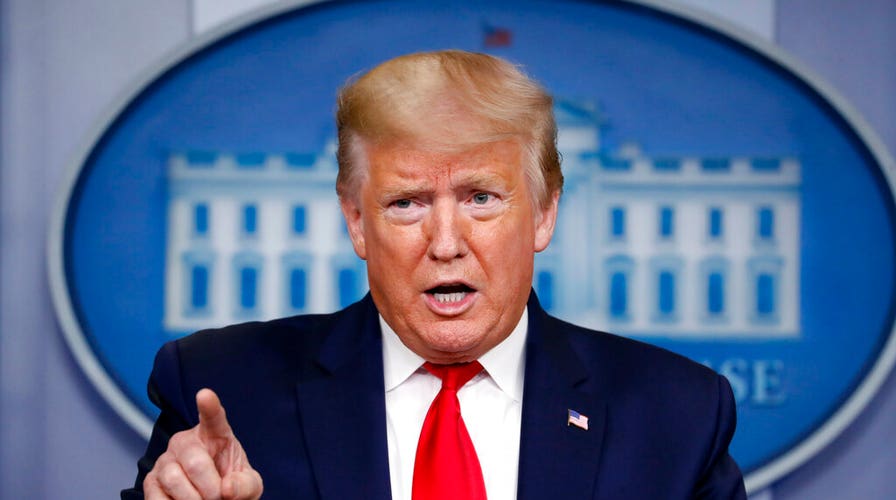Estimates suggest social distancing has drastically reduced COVID-19 spread in US
Jonathan Serrie reports from outside the CDC in Atlanta, Georgia.
Get all the latest news on coronavirus and more delivered daily to your inbox. Sign up here.
President Trump said Friday that that choosing when to move to reopen the U.S. economy amid the coronavirus pandemic would be "the biggest decision I've ever had to make."
"I want to get it open as soon as possible,” Trump told reporters at Friday's briefing with members of the White House task force. "This country was meant to be open and vibrant and great.”
THE CORONAVIRUS OUTBREAK STATE-BY-STATE
The president added that he would formally convene an "Opening our Country" task force April 14 that will be comprised of doctors and business leaders. According to Trump, the second, smaller task force would "include names that you have a lot of respect for."
In an effort to prevent the spread of coronavirus, the governors of 42 states, the District of Columbia and Puerto Rico have issued so-called "stay-at-home" orders advising residents to remain indoors except to perform essential work, duties or chores.
Those orders, as well as federal social distancing guidelines and restrictions on public gatherings, have ground large portions of the U.S. economy to a halt. According to the Labor Department, more than 16.8 million people have filed for unemployment insurance since the middle of March, when the federal coronavirus guidelines went into effect.
As of Friday afternoon, Johns Hopkins University said that there were more than 486,000 confirmed coronavirus cases in the U.S. and more than 18,000 deaths caused by the virus. More than 40 percent of U.S. deaths have happened in New York state, which reported 777 new deaths on Friday.
CLICK HERE FOR FULL CORONAVIRUS COVERAGE
Trump made a point Friday of saying that he would continue to listen to health experts like Drs. Anthony Fauci and Deborah Birx while considering when to relax the federal guidance. Health experts have warned that if the country rolls back restrictions too quickly, case levels could once again begin to soar, especially without widespread testing to determine who might be a carrier of the virus.
“I listen to them about everything,” the president said, adding: “We’re not doing anything until we know that this country is going be healthy. We don’t want to go back and start doing it over again.”
While the new coronavirus causes mild or moderate symptoms for most people, for some, especially older adults and people with existing health problems, it can cause more severe illness or death. And research has shown that people can be highly infectious even if they are not displaying symptoms.
Fauci, the nation’s top infectious-diseases expert, told CNN earlier Friday that there will be coronavirus cases whenever the restrictions are relaxed.
“When we decide, at a proper time, when we’re going to be relaxing some of the restrictions, there’s no doubt you’re going to see cases,” he said. “The question is how you respond to them.”
The Associated Press contributed to this report.




